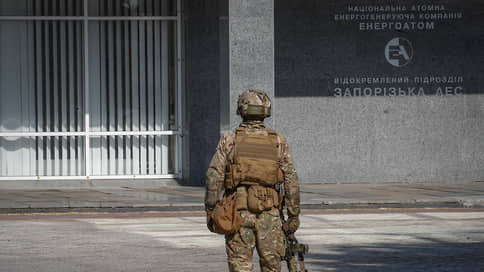The new object of the federation – Newspaper Kommersant No. 185 (7386) dated 10/06/2022
[ad_1]

The authorities of the Russian Federation have determined the legal status of the Zaporizhzhya NPP, which is now located on the territory of the Zaporozhye region annexed to the Russian Federation. The station will be transferred to the ownership of the Russian Federation, and a new subsidiary of Rosenergoatom will manage it. The scheme, according to lawyers, is designed to reduce sanctions risks for Rosatom. Analysts believe that the state corporation will most likely be able to avoid sanctions, but even if this does not happen, the restrictions will be “targeted and as accurate as possible,” given Rosatom’s leading position in the global market for nuclear materials and services.
The President of the Russian Federation signed decree, which determines the conditions for the transition of the Zaporizhzhya NPP (ZAES, 6 GW) to the Russian jurisdiction. According to the published document, the Russian state will be the owner of ZNPP, for these purposes the government will create a new federal state unitary enterprise (FSUE) Zaporozhye NPP.
The plant operator will be another structure – JSC “Operating Organization of Zaporozhye NPP” (EO ZNPP) – a 100% subsidiary of the Rosenergoatom Concern (REA, part of Rosatom, the single operator of all nuclear power plants in the Russian Federation). A company with an authorized capital of 2 billion rubles. established October 3rd. “The new operating organization is designed to ensure the safe operation of the nuclear power plant and the professional activities of the existing plant personnel with the support of the REA,” the concern said on October 5.
As expected, the ZNPP operating licenses issued by Ukraine remain valid until Russian regulators issue new documents in accordance with Russian laws.
The transitional period of special regulation will last until January 1, 2028: for five years, in particular, there will be a special regime for nuclear supervision, state regulation of industrial safety, as well as the use of financial resources to ensure safety at ZNPP.
The general director of the new operating company is the former chief engineer of the Balakovo NPP, Oleg Romanenko, who, according to unofficial information, has been at the plant since spring. All personnel currently working at ZNPP will soon be employed by the new operating organization. The position of director of ZNPP is still vacant: according to Kommersant’s information, one of the Ukrainian employees can probably take this position.
The former general director of the ZNPP, Igor Murashov, was expelled to the territory of Ukraine at the beginning of the week: according to the Russian side, he collaborated with the Ukrainian special services.
The separation of the functions of operating nuclear power plants and owning property is probably necessary to reduce the sanctions risks of Rosatom, says Andrey Yakovlev, managing partner of the Yakovlev and Partners legal group. “The adopted scheme for separating areas of responsibility is the best option from a legal point of view. The state corporation will only deal with issues of monitoring the safe operation of the station,” he notes. In his opinion, Western countries are unlikely to dare to impose restrictions on Rosatom for reasons of nuclear safety, since they themselves depend on Russian supplies of fuel and uranium. So far, no sanctions have been imposed against Rosatom and the Russian nuclear industry as a whole.
Andrey Baklitsky, a senior fellow at the UN Institute for Disarmament Research, believes that the legal scheme of ownership and control invented by the Russian authorities will not be able to fully protect the REA from sanctions. “REA operates mainly in Russia, but even in its case, problems may arise: for example, the concern is one of the shareholders of the Akkuyu Nuclear company, which is building a nuclear power plant of the same name in Turkey,” the analyst warns.
The situation with the parent state corporation Rosatom looks more complicated. If Western countries decide to impose sanctions on it, then the restrictions are likely to be “targeted and as accurate as possible” so as not to harm projects in Western countries that cannot be replaced instantly, says Andrei Baklitsky. In particular, Rosatom occupies a leading position in the world in the market of services for uranium enrichment (about 40%), as well as for uranium mining (about 15%). Western countries, by imposing significant sanctions, can also spoil relations with allies and partners where Rosatom is building nuclear power plants (India, Turkey, Egypt). “When in 2019 the administration of US President Donald Trump, under the threat of sanctions, demanded that Rosatom stop work on the second power unit of the Bushehr nuclear power plant in Iran, Rosatom refused, and there were no sanctions,” Andrei Baklitsky recalls.
ZNPP is the largest nuclear power plant in Europe, consisting of six Soviet-designed VVER-1000 power units with a capacity of 1 GW each. ZNPP has been under the control of the Russian military since March, but all this time it was de jure subordinate to the Ukrainian Energoatom. In early September, the last working fifth and sixth power units of the station brought out into a cold shutdown due to regular shelling and power line breaks. Then the military-civilian administration of the region assured that they would not turn on the nuclear power plant for security purposes until the cessation of hostilities.
[ad_2]
Source link





